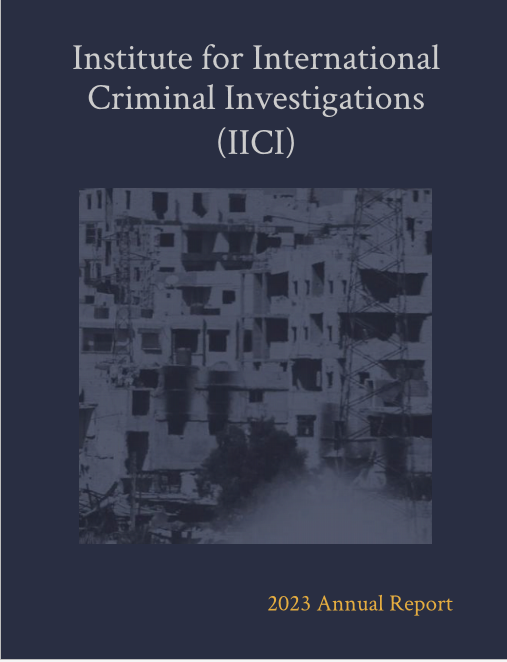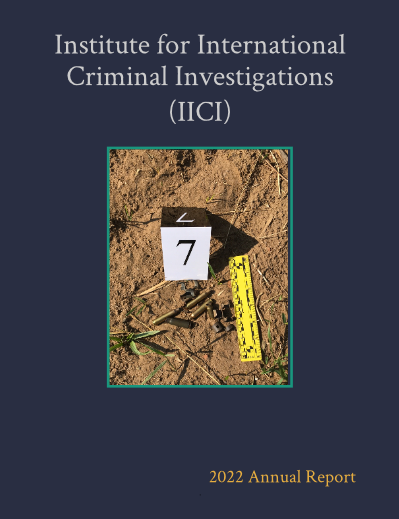About the IICI
Institute for International Criminal Investigations
The IICI is a non-profit, non-governmental organisation dedicated to the capacity-building and support of international criminal and human rights investigators and related professionals in the investigation of war crimes, genocide crimes against humanity and serious human rights violations, and to strengthening international investigation best practices and standards.
IICI was founded at the time of the establishment of the International Criminal Court, in recognition that, despite the more widespread application of international criminal law, there was no comprehensive training programme for investigators of international crimes.
Since its inception, IICI has trained and mentored hundreds of investigators across the world in the hard skills and techniques necessary to acquire evidence of a standard which will stand up to scrutiny in criminal courts, human rights commissions and elsewhere, and allow perpetrators of mass atrocities to be brought to justice. We conduct our regular courses in The Netherlands. Our bespoke capacity-building and technical advisory projects are delivered globally, from Asia, the Middle East and Europe to Africa and Latin America.
Course participants and project beneficiaries include national war crimes units, the International Criminal Court, the OHCHR and other UN agencies, UN and other peacekeeping missions and forces, national human rights bodies, and local and international NGOs. IICI is JRR’s partner for specialised investigation courses for its roster of rapidly-deployable justice and human rights experts.
IICI teaches core skills, but also seeks to develop new ones amongst the international criminal investigation community, including most recently:
- investigating conflict-related sexual and gender-based violence (SGBV)
- international crimes affecting children
- collection and evaluation of open-source evidence of international crimes
- investigating financial dimensions of international crimes
IICI contributes to the development, clarification and strengthening of international investigations standards and best practices through our capacity-building and experts’ advisory work, including written guidelines to plug gaps, such as the IICI guidelines on remote interviewing, IICI guidelines for investigating conflict-related sexual violence against men and the forthcoming IICI guidelines for investigating international crimes affecting children.
IICI is leading the Murad Code Project, which has the Global Code of Conduct for Gathering and Using Information about Systematic and Conflict-Related Sexual Violence at it's heart.
IICI has also supported the development and implementation of the International Protocol on the Documentation and Investigation of Sexual Violence in Conflict (1st and 2nd editions), including through training and mentoring projects and by developing training materials accompanying the protocol and developing supplements to the protocol for Myanmar, Iraq and Sri Lanka.
Legal status and governance
The organisation is comprised of the Institute for International Criminal Investigations (IICI) and the Institute for International Criminal Investigations Foundation (IICIF). IICI is an American 501c(3) tax-exempt corporation incorporated in the State of California. IICIF is a Dutch charitable foundation based in The Hague, The Netherlands.
The People page explains IICI’s day-to-day management and governance structures.
Financing and Support
The IICI is grateful for the continued support of the ICC, ICTY, the MICT and other UN and international organisations in making their staff members available as pro bono trainers on IICI courses. We also want to thank Civitas Maxima and other partner organisations for making their staff available to assist as trainers, mentors and moderators.
The Institute is funded by grants from foundations, government agencies and partner organisations, and donations from individuals. The IICI depends on these grants and donations to continue its work and is grateful for the support provided to date, particularly by the Oak Foundation and the Sigrid Rausing Trust, but also by the following since its foundation:
- The Government of Canada, Global Affairs Canada (on Murad Code Project)
- The Government of Canada, Human Security Program
- The Government of Austria, Austrian Development Aide – Uganda Justice Law and Order Sector
- The Government of Denmark, Ministry for Foreign Affairs
- The Government of Finland, Finnish Ministry for Foreign Affairs
- The Government of Ireland, Irish Aid
- The Government of Ireland, Irish Department of Foreign Affairs, Development Cooperation Directorate
- The Government of France, The French Embassy in The Hague
- The Kingdom of Lesotho
- The Government of The Netherlands, The Mayor’s Office, The City of The Hague
- The Government of New Zealand, The Ministry of Foreign Affairs of New Zealand
- The Government of Sweden, Ministry of Foreign Affairs
- The Government of the United Kingdom, The British Foreign & Commonwealth Office (including the Preventing Sexual Violence in Conflict Initiative)
- The United States Institute of Peace
- The Agence Intergouvernementale de la Francophonie
- The Bodyshop Foundation
- Clarence & Snell LLP
- The John D. and Catherine T. MacArthur Foundation
- The John Merck Foundation /
- The Lisbet Rausing Trust
- The Open Society Institute
- The Potrero Nuevo Fund / The Reebok Foundation
- Philanthropic Ventures Foundation
- Polar Lights FoundationWilliam Chrisman
- Morrison & Foerster
- Beth Van Schaack and Dennis Lang
- M. Quinn Delaney & Wayne D. Jordan
- Robert & Sheila Berner
- Nancy Pemberton & Jeff Parker
- Gerald Gray & Coleen Higa
- Cris Arguedas
- Karen Snell & Raymond McGrath
- Jeffrey L. Bornstein & Veronica Sanchez
- Nanci Clarence & Lidia Szajko
- Seamus & Debra Kennedy
- William Goodman & Victoria Belco
- Elizabeth Van Schaack & Brent Dennis Lang
- James M. Byrne
- Thomas Eastridge
- Paul Meltzer
- David Miller & Cynthia Moore
- Jeffrey S. Ross & Jan Platt
- Richard Snell & Alice W. “Dinky” Snell
- Jabari Gray
- Richard Grosboll
- Sarah McGrath
- David Kadish
- Robert Luskin & Charlotte Fallon
- Ed Swanson & Mary McNamara
- Geri Webb
- Tony Tamburello
- Monique & Cesar Alonso
- Michael & Cathy Doogan
- Gilbert Eisenberg
- Stuart Hanlon
- Jonathan V. Holtzman
- Lisa Honig
- Richard B. & Maria Mazer
- Naomi Rustomjee
- Marilyn Berlin Snell & Gregory Williams
- Jacqueline Tully & Beth Aboulafia
- Douglas R. & Terry F. Young
- Elizabeth Zitrin & The Zitrin Foundation
- Denise M. Alter
- Ronald P. & Madeleine M. Gallagher
- Bruce B. Henderson
- Anne Lackey & Kevin Rayhill
- James Larson & Susan Illston
- Matthew McGrath & Randi Field
- Jose M. Cisneros & Mark Kelleher
- Tom Drain & Roy Loesser
- Patricia Koren & Robert Siegel
- Janet M. & Barry J. Portman
- Rachel Sommerville & Tom Athanasiou
- Russell Stetler
- Gideon Weil & Jacquelyn Weil
- Gloria White
- Cheri Bryant
- Zoe Christopher
- Megan Dane Colling
- Omar M. Dajani & Jean-Marie Stratigos
- Melody Ermachild
- Deborah Regina
- Carol Pemberton
IICI would also like to thank AKD International for making Winfried van den Muijsenbergh available to do his generous pro bono work on behalf of the Institute.

